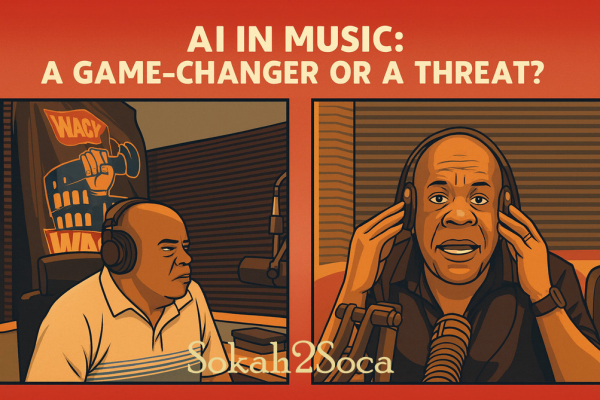Dive deeper into Caribbean music and culture at Sokah2Soca — your go-to source for Soca, Calypso, and Carnival coverage. First published on Sokah2Soca, now streaming live via Island Vybe Radio.
There’s been a surge in AI-generated tracks lately—mashups of classics, genre-bending remixes, and full compositions created in minutes. Therefore, it was only appropriate to focus today's episode on AI in music. We themed the discussion: “AI in Music—A Game-Changer or a Threat?”
We’re living in fascinating times. AI is reshaping the music industry, offering speed and innovation—but also raising tough questions about creativity, ownership, and the role of human artistry.
Today's episode of WACK Visual Radio featured music producer Kenny Phillips and host Mr. Desmond, providing listeners with an intimate glimpse into the power and potential disruption of AI in music. Deso, with his inquisitive nature, provided listeners with a firsthand view of the power and potential disruption of AI in music. The discussion was intriguing because Deso, a DJ by profession, opposed AI music production due to its implications for Trinidad's culture and competitions. Kenny, the music producer, was unconcerned because he has a style that is well known, with years of production knowledge that Ai programs have yet to learn.
But here is where it got intriguing. In a spontaneous challenge, Kenny used Suno Ai to generate a song based on a caller’s request: a tune about living in Moruga and fishing off the coast of Venezuela. Kenny used prompt engineering to input the relevant information, and within ten minutes, two versions were created and aired live.
Deso was stunned but did not leave the studio, as he jokingly threatened to do if the song was quickly generated. Callers flooded the lines, buzzing with curiosity about how it was done. We don't have a copy of the song created during the show, but we included an AI-produced song to accompany the post.
The demonstration wasn’t just a tech demo—it was a cultural moment. Whether one agrees or disagrees with its application, AI has arrived and is significantly altering the landscape. But whether it’s a threat or a tool depends on who’s using it—and how.
This is a situation of 'get with the program or be left behind.' One of the benefits of Ai is the ease of creation; it is fast, affordable (money is always a factor), and accessible. All it takes is a computer and the right software. Of course, if you understand song structures and have received some music training, using the software will be much easier and quicker.
On the other hand, the issues of Copyright and Royalties come into play. This is an area that COTT needs to address. One has to ask the obvious question: who owns an Ai-generated song? As far as I know, no law addresses who owns an AI-generated song: the user, the developer, or no one. There is the issue of copyright infringement using Ai. These programs are trained using copyrighted material... the matter will be one for the courts to decide for sure.
We must also contemplate the following: Training AI tools on copyrighted music also carries the risk of unintentional infringement. And if the song earns money—who is paid? Deso's concerns may be legitimate, but DJs have been using music in parties, paying small sums for an annual DJ license. As it relates to music production, Kenny pointed out that while AI can create music fast, a skilled producer still makes the difference. Regardless of how powerful Ai becomes, as it relates to music, it is not a replacement for human creativity. Please share this post and don't forget to leave a comment.


